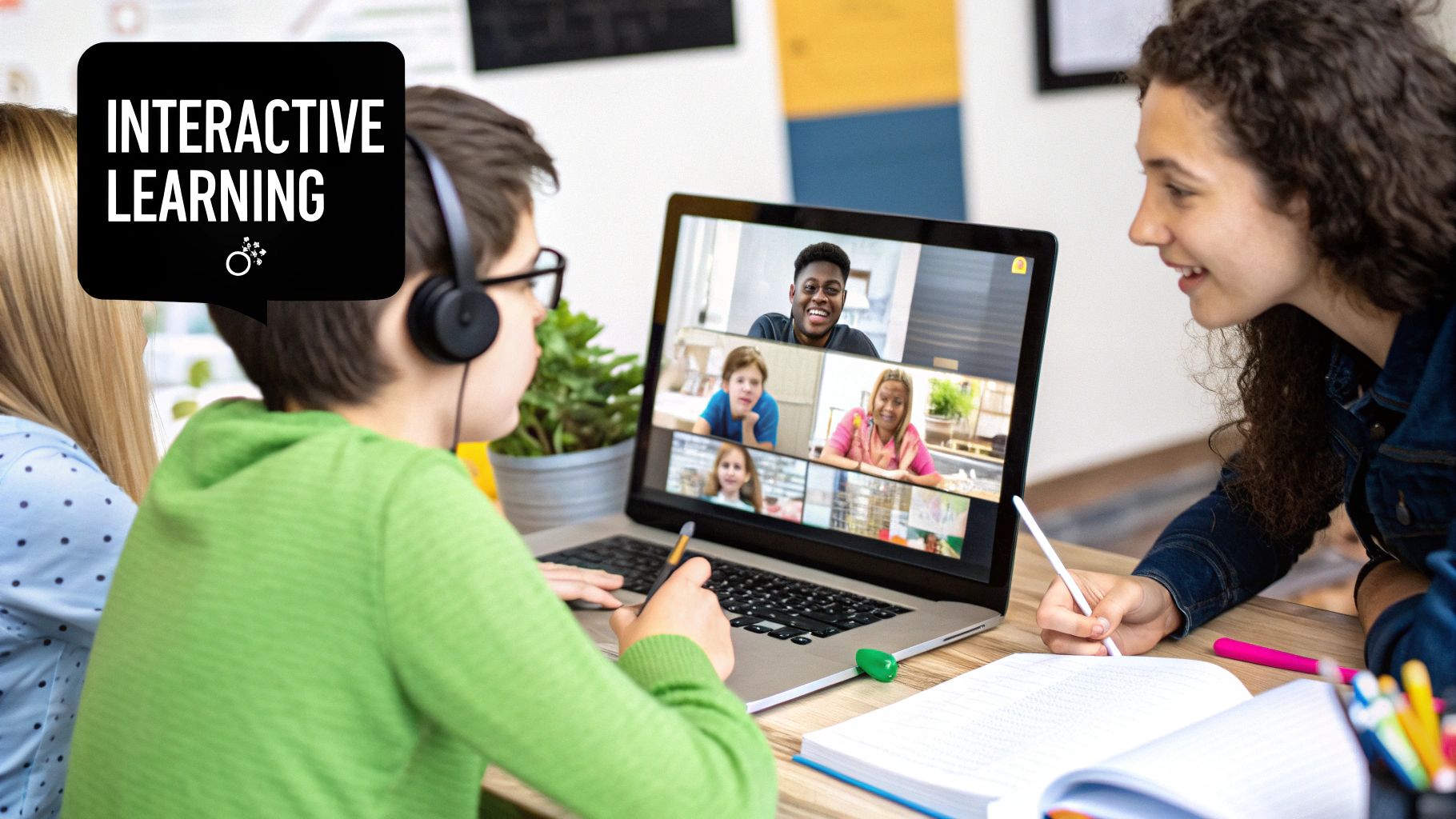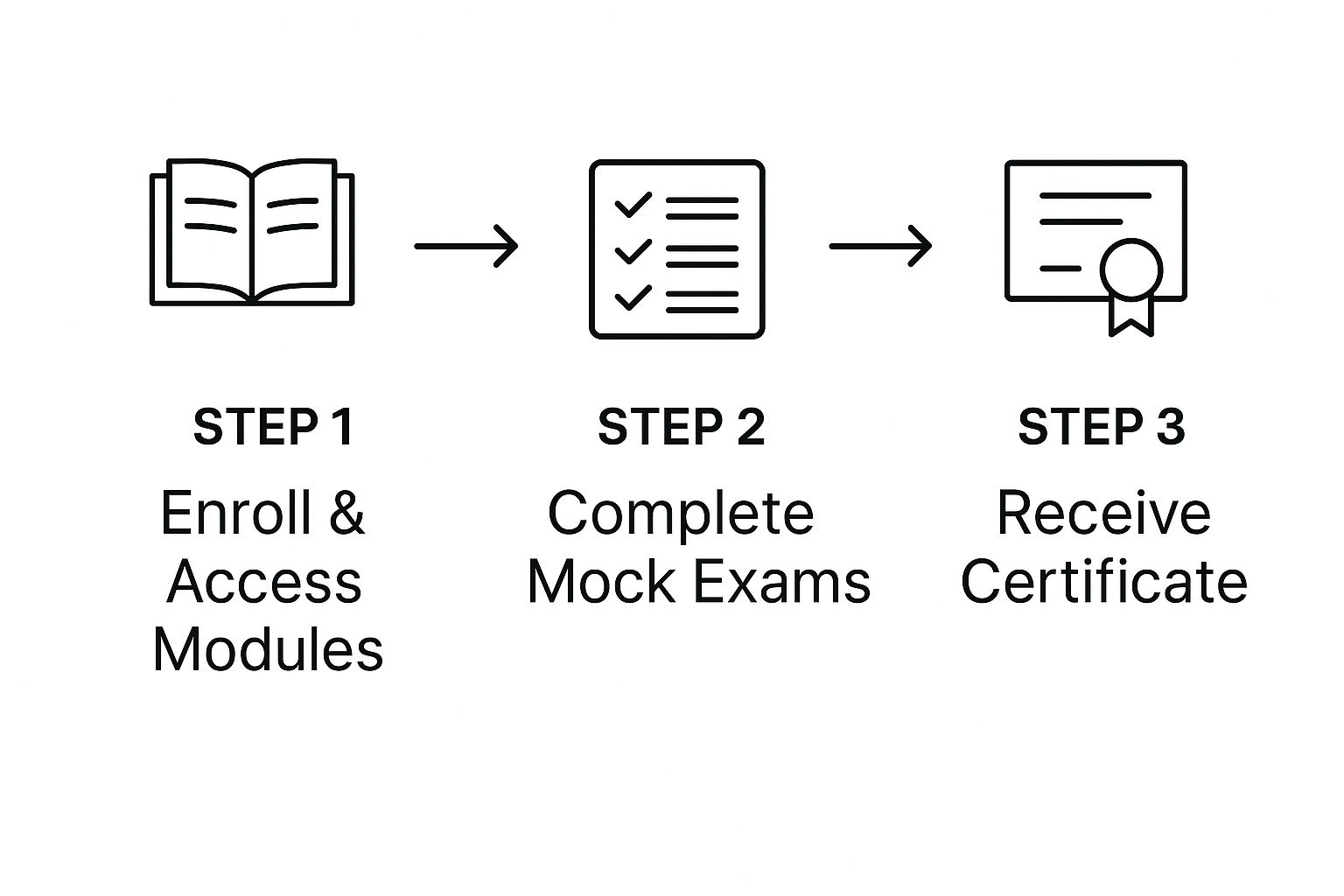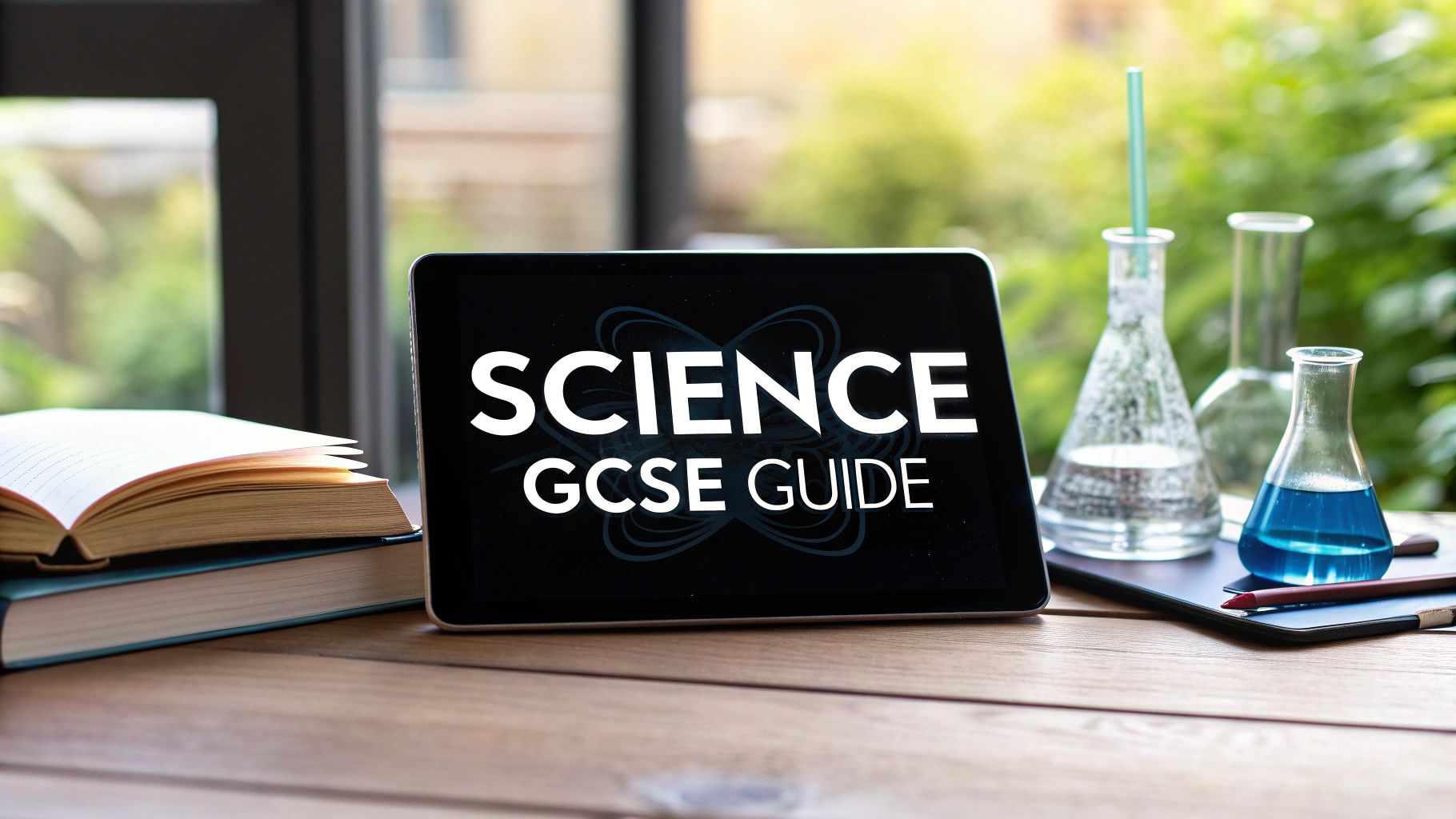Choosing the right educational path for your child feels like one of the biggest decisions you'll ever make. An online science GCSE course can be a truly transformative solution, offering a flexible and supportive space where your child can not only succeed academically but also rediscover their confidence, far from the pressures of a traditional classroom.
Is an Online Science Course Right for Your Child?
Watching your child struggle at school is heart-wrenching. Maybe the busy, noisy classroom makes them anxious, causing that knot of dread in their stomach each morning. Or perhaps the rigid pace means they’re either falling behind and losing hope, or bored and waiting for others to catch up, their natural curiosity dimming. For many families, this is an all-too-familiar story, and it’s often the moment when you start thinking, "There has to be a better way."
This isn’t just about finding a more convenient way to study. It’s about putting your child’s well-being and unique learning needs front and centre. It’s about giving them back the joy of learning.
Finding a Better Fit for Your Teen
Let’s look at a few common situations where an online course isn't just an alternative—it's a lifeline.
- For the anxious learner: Imagine your child, who feels overwhelmed by social pressures or a chaotic classroom, finally being able to take a deep breath and learn in the calm, focused space of their own home. No more fear of being called on or feeling lost in the crowd.
- For the self-paced achiever: A child who grasps concepts quickly, like understanding the periodic table in one go, can forge ahead without waiting. On the flip side, a student who needs more time to understand something tricky like balancing chemical equations can review materials as often as they need, without feeling rushed or judged.
- For the student needing a second chance: Resitting an exam can be a stressful, demoralising experience. An online course removes the stigma, letting them focus purely on mastering the subject with fresh materials and dedicated support, turning a past failure into a future success.
The goal is to find an environment where curiosity is reignited, not extinguished. When a child feels safe and supported, their natural enthusiasm for subjects like biology, chemistry, and physics can flourish again.
The popularity of online science courses has grown massively, largely because of this personalised approach. In fact, some providers report truly impressive results. CloudLearn, for example, boasts a 98% pass rate for its fast-track online Science GCSE course, proving just what’s possible when a child's individual needs are met.
Ultimately, choosing an online science GCSE course is about finding a path that honours your child's individual journey. It's about giving them the tools and the space they need not just to pass an exam, but to build confidence and develop a genuine love for learning.
If you're exploring this path, our detailed guide on online GCSE courses in the UK can offer more insights and help you make an informed decision for your family.
What the Online Science Classroom Actually Looks like

The idea of a classroom without walls can feel a little strange, even worrying. As a parent, you need to feel certain your child is getting a structured, engaging education—not just sitting passively in front of a screen, feeling isolated.
So, let’s pull back the curtain on what a dynamic science GCSE online course really involves. It’s far more than a digital textbook; it's a vibrant learning ecosystem built around your child.
Think of it as a personal, digital science lab built piece by piece around their needs. Instead of one teacher trying to manage a noisy room of thirty students, the learning is delivered through a blend of carefully designed tools. Each element works together to make complex ideas like photosynthesis or electrical circuits feel manageable and, most importantly, interesting.
This approach is designed to empower your child. They can pause, rewind, and re-watch a tricky explanation about cell division until it finally clicks. That sense of "Aha, I get it now!" is a powerful feeling they simply can't get in a traditional classroom that has to keep moving.
The Building Blocks of Online Science Learning
So, what does your child actually do all day? A typical module in Biology, Chemistry, or Physics isn't just about reading. It's an active, multi-sensory experience, constructed from key components that build both understanding and confidence.
- Engaging Video Lessons: These aren't long, rambling lectures. They're short, focused videos that break down big topics into bite-sized chunks. A lesson on genetics, for instance, won't just talk about DNA; it will use animations to show a double helix unzipping and replicating, making an abstract concept visual and clear.
- Interactive Simulations: This is where the "digital lab" really comes to life. Your child can run virtual experiments—like mixing chemicals to see a colourful reaction or dissecting a virtual frog without any of the mess or ethical concerns. They get to learn by doing, feeling like a real scientist in a completely safe environment.
- Downloadable Worksheets and Resources: To make sure the learning sticks, courses provide structured worksheets and revision guides. These are perfect for practising concepts like Punnett squares away from the screen, helping to solidify knowledge with good old-fashioned pen and paper.
A well-designed online course understands that every child learns differently. The goal is to provide a variety of tools so your child can find the method that works best for them, whether that’s watching, doing, or practising offline.
Tracking Progress and Staying on Course
One of the biggest worries for any parent is that quiet fear: is my child actually keeping up? A quality science GCSE online course has features built-in to give both of you peace of mind.
Most platforms include a personal dashboard. This is your child’s mission control, a central hub where they can see exactly where they are in the curriculum, which lessons they’ve completed, and what’s coming up next. It creates a clear visual roadmap, turning a huge subject into a journey of small, achievable steps.
On top of that, auto-marked quizzes usually follow each lesson. This provides instant feedback, which is incredibly powerful for building a child’s confidence. Instead of waiting days for a test to be marked and feeling anxious, they immediately know which areas they’ve mastered and which topics need a bit more work. It puts them in control and makes the whole experience feel supportive and effective.
How Your Child Will Actually Study and Revise

The flexibility of online learning is a huge plus, but it often comes with a nagging question for parents: how do I know my child will actually stay on track without a teacher watching over them? It’s a completely valid concern. You want to see them take ownership of their studies, not get lost in a sea of unstructured time and endless distractions.
The good news is that a quality science GCSE online course is designed with this exact challenge in mind. It replaces the rigid, one-size-fits-all school timetable with a powerful framework built on accountability, motivation, and smart, modern tools. It’s less about chasing strict deadlines and more about helping your child build sustainable, healthy study habits that will serve them for life.
This structure empowers your child to see their progress in real-time. It turns the daunting task of revision into a series of small, achievable wins, fostering a sense of control over their learning—which is a massive confidence booster for any teenager.
Creating a Real-World Study Plan
So, what does this look like in practice? A common recommendation for an online GCSE is around 100 hours of study per subject. That might sound like a lot, but when you break it down, it becomes far more manageable and fits into real family life.
- Weekly Goal: This translates to just 2-3 hours per week over a typical academic year. For example, your child could do an hour on Tuesday after school and another hour on Saturday morning.
- Daily Target: For a child who prefers shorter bursts, it could be as little as 30 minutes a day, five days a week—less time than an episode of their favourite show.
- Flexible Approach: If they have a busy week with other commitments, like a sports match or a family event, they can catch up over the weekend. The course structure adapts to their life, not the other way around.
The real beauty of this model is that it teaches time management—a critical life skill. Your child learns to balance their workload and take responsibility for their own schedule, all within a supportive framework. You get to see them grow into a more independent young adult.
Reputable platforms provide everything needed to make these hours count. This includes video tutorials, practice questions, and mock exams that are perfectly aligned with the major UK exam boards like AQA and Edexcel.
Smart Tools That Build Confidence
Beyond a simple schedule, the best online courses use clever features to keep your child engaged and motivated, especially when things get tough. Instant feedback from auto-marked quizzes, for example, is a complete game-changer for their self-esteem.
Imagine your child finishing a quiz on chemical reactions and immediately seeing they got 8 out of 10. They can instantly see which two questions they got wrong and revisit the material while it's still fresh in their mind. This immediate loop of practice, feedback, and improvement is incredibly powerful for building both knowledge and belief in their own abilities.
Full-length mock exams are also crucial for building exam-day confidence, simulating the real experience in a low-pressure environment. And it's not just about traditional tests; online learning embraces modern assessment, too. It’s worth exploring how the future of student assessment with video assignments is becoming a key part of how students can show what they know in creative ways.
Ultimately, these tools guide your child towards becoming an independent learner. To give them an extra boost, check out our guide on https://queensonlineschool.com/how-to-revise-for-gcses/.
Choosing the Right Online Course Provider
Navigating the world of online education can feel overwhelming. As a parent, you’re not just looking for a course; you’re searching for a partner who will back your child’s learning, nurture their confidence, and genuinely care about their success. Making the right choice is crucial, and it goes far beyond a flashy website or a low price.
The key is to place your child’s individual needs at the very centre of your decision. A provider that works wonders for one student might not be the right fit for yours. You need to look for real evidence of a structured, supportive, and accredited programme that will see your child through from their first lesson to their final exam.
Ultimately, this process is about asking the right questions and knowing what to look for. It’s about making sure the provider you choose will be there with a reassuring voice when your child feels stuck on a tough chemistry problem, or when you feel anxious about arranging their exams.

Check for Official Accreditation
First and foremost, accreditation is non-negotiable. The course must be officially recognised by a major UK exam board like AQA, Pearson Edexcel, or OCR. This is the only way to guarantee the qualification your child earns is the same as one from a traditional school and will be accepted by colleges, universities, and employers.
If a provider isn't crystal clear about which exam board they use, that's a significant red flag. You should be able to find this information easily on their website. Think of it as the bedrock of a legitimate science GCSE online course.
Evaluate the Level of Tutor Support
This is where you can really see the difference between providers. Vague promises of "tutor support" are not enough. You need to dig deeper and find out what that support actually looks like for your child, in a moment of need.
For example, if your child is confused about Newton's laws of motion the night before a mock exam, what happens? Is there just a generic email inbox with a 48-hour response time? Or does your child have access to real, one-to-one help from a subject specialist who can jump on a quick call and explain it? Quality support can make or break your child's experience, turning a moment of panic into a moment of clarity.
The most important question you can ask is, "What is your process for supporting a student who is falling behind or struggling with a topic?" Their answer will tell you everything you need to know about how much they prioritise individual student well-being.
Questions to Ask Potential Online Course Providers
Before you commit, it’s worth having a list of practical questions ready. This checklist will empower you to make a confident and informed choice for your child, ensuring you find the best and most supportive provider for their Science GCSE.
| Area of Enquiry | Key Question to Ask |
|---|---|
| Curriculum & Materials | Is the course content up-to-date and fully aligned with the exam board syllabus? Can we see a sample lesson? |
| Tutor Qualifications | Are the tutors qualified teachers with experience in their specific science subject? What's their approach to helping a student who has lost confidence? |
| Student Support | How quickly can my child expect a response when they ask a question? Are one-to-one sessions included? |
| Exam Arrangements | How do you help us find and register with a physical exam centre? Do you have a list of partner centres? |
| Progress Tracking | How can I, as a parent, monitor my child's progress and see their results? Is there a parent portal? |
Finding the right educational home for your child is a journey, not a single decision. Choosing a provider who is transparent, supportive, and properly accredited ensures your child has the best possible foundation for success.
For a deeper dive into what makes a great learning experience, you can learn more about our Science GCSE online courses and see how we put student support first.
The Journey from Enrolment to Exam Day
Deciding to start a science GCSE online course can feel like a huge step, but the path from signing up to sitting the final exam is much clearer than you might think. Let's walk through this journey, breaking down what seems like a monumental task into a series of simple, manageable steps for your family.
The whole process is designed to be as straightforward and reassuring as possible, cutting out the usual administrative headaches so your child can get on with what matters: learning. Think of it as a clear roadmap that gives both of you confidence from day one.
The First Steps: Enrolling and Getting Started
Enrolment is usually just a simple online form. Once that’s done, you and your child get immediate access to the course portal. This isn’t just a folder of files; it’s a fully structured learning environment. The first thing you'll likely see is a welcome module, showing you how to navigate the platform, get in touch with tutors, and keep an eye on progress.
To help your child settle in, it’s a wonderful idea to create a dedicated study space together. It doesn’t need to be a whole room—a quiet corner with good lighting, a comfy chair, and a clear desk works wonders. This simple act of setting up their space creates a mental boundary between ‘home time’ and ‘study time’, helping them to focus and feel professional.
This infographic shows the simple, three-stage process that most online courses follow.

As you can see, the journey is intentionally streamlined. It’s built to guide your child from their first login right through to their final certificate, without any unnecessary complications.
The Big Question: Arranging the Final Exams
One of the biggest worries for parents is often the exam itself. How does an online student sit a physical, invigilated exam? This is where your course provider becomes a crucial partner, and you are absolutely not left to figure this out alone.
Reputable providers have dedicated teams whose entire job is to guide you through this process. They will help you find and register with an approved exam centre in your local area, taking the stress out of the logistics.
The key is to start this conversation early. Most providers recommend getting in touch about exam arrangements at least six months in advance. This gives you plenty of time to find a convenient centre without any last-minute stress, so you can focus on supporting your child's revision.
Here’s how it usually works:
- Provider Support: You let your course provider know you're ready to arrange the exam. They’ll then give you a list of partner centres or guidance on how to find one nearby.
- Centre Registration: You contact the exam centre directly to register your child as a private candidate. There will be an exam fee to pay directly to the centre.
- Final Preparation: Your child completes their final revision and mock exams, feeling fully prepared and confident about the format and timing of the real papers.
By breaking the journey down, the path becomes clear. It’s a supportive process designed to get your child from that first hopeful enrolment day to the proud moment they open their results, feeling accomplished and ready for whatever comes next.
The Life Skills Gained Beyond the Syllabus
Taking on a science GCSE online course is about so much more than just memorising the Krebs cycle or learning formulas for physics. It’s a journey that builds character, shaping your child into a more capable and resilient young adult. This process is just as much about personal growth as it is about academic achievement.
When your child is responsible for managing their own study schedule—deciding to study biology on Monday and chemistry on Wednesday—they naturally develop powerful self-discipline and time management. Successfully working through complex scientific topics online also gives them a genuine, hard-won sense of self-esteem. You see them stand a little taller.
This isn't just about earning a qualification. It’s about your child discovering they are resourceful and independent, ready to face their next challenge with newfound confidence.
This kind of self-directed learning encourages vital skills like creativity and project management. We see this same growth in learners taking everything from a science GCSE to an online course on creative skills like illustrating a children's book.
The analytical abilities they develop are also incredibly valuable in today's world. The increasing popularity of subjects like online GCSE Statistics signals a growing focus on data literacy, which is essential for careers in fields ranging from psychology to accountancy.
Any Questions?
It's completely normal to have questions swirling around when you're exploring online education. As a parent, you want to be sure you’re making the best decision for your child's future. Here are some of the most common queries we get from families just like yours, with clear, straightforward answers.
Are Online GCSEs Recognised by Universities and Employers?
Yes, absolutely. An online GCSE holds the exact same weight and is the very same qualification as one taken in a traditional school. It isn't a different or lesser version.
The certificate is awarded by official exam boards like AQA or Edexcel and doesn't mention how the course was studied. So when your child applies for college or a job, their qualification is judged on its own merit. Universities, colleges, and employers fully recognise it, ensuring your child’s hard work opens all the right doors.
How Does My Child Do the Practical Science Experiments?
This is a great question and one we hear a lot. Without a physical lab, how can students get that essential hands-on experience? Most leading online courses tackle this with a mix of high-quality video demonstrations and interactive virtual lab simulations. For example, a student can perform a titration on screen, adding chemicals drop by drop and seeing the colour change, letting them explore scientific principles safely and effectively from home.
For the official assessment, some exam boards require students to attend a practical session at a partner centre. Others build questions about practical skills right into the written exams. It’s always best to confirm the specific requirements with your chosen course provider.
The goal is to ensure that even without a physical lab, your child develops a solid, practical understanding of scientific methods. The focus is on comprehension and application, not just theory.
What Support Is Available if My Child Gets Stuck?
No child should ever feel like they're learning in isolation, struggling alone with a difficult concept. A good science GCSE online course will have strong support systems built in from the very start. This usually includes direct access to qualified tutors through email, live chat, or scheduled one-to-one video calls.
Many platforms also have lively student forums where learners can ask questions and help each other out, fostering a sense of community. The most important thing is to choose a provider that offers accessible and responsive tutor support, so you have peace of mind that help is there the moment your child feels unsure or overwhelmed.
At Queens Online School, we believe that personalised support is the key to unlocking your child's potential. Our subject-specialist teachers are here to provide the expert guidance and encouragement your child needs to thrive. Find out more about our supportive learning environment at https://queensonlineschool.com/.

